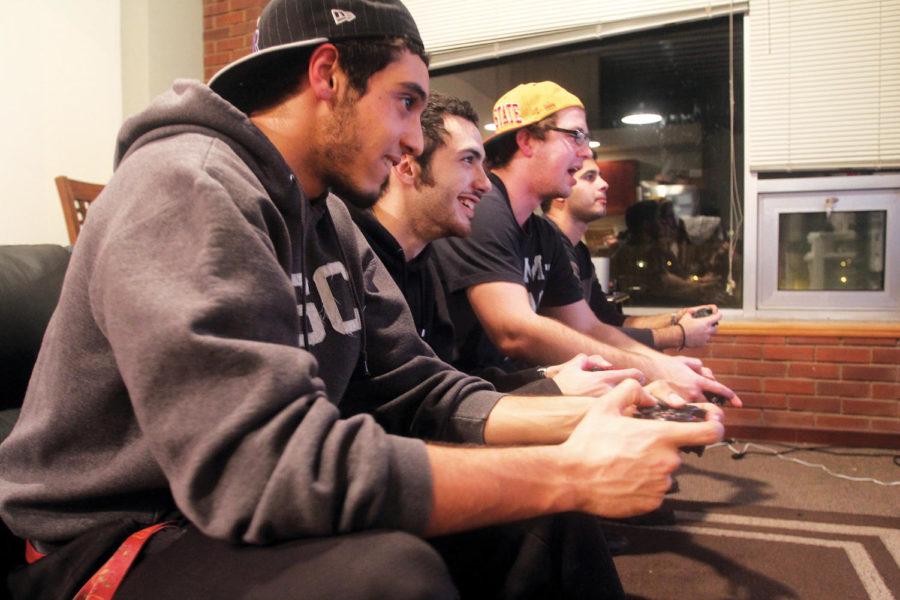Government responds to media violence
January 28, 2013
Video game violence has been a controversial subject in technology history ever since games like Grand Theft Auto started simulating “realistic” violence where players are rewarded for killing, maiming and causing destruction.
More than two years ago, America saw governmental controversy when a California law considered not allowing minors to buy extremely violent video games.
The Entertainment Software Association, which operates the video game content rating system ESRB and the Electronic Entertainment Expo, responded by stating that video games are a respected speech protected under the First Amendment.
The dispute eventually ended with the Supreme Court saying it is unconstitutional to treat video games as if they have no First Amendment rights.
Robert West, professor of psychology at Iowa State, studies about cognition, control and neural processes. His laboratory’s Psychophisiology journal revealed that “undergraduate males who played a lot of first-person shooter video games had difficulty maintaining attention for as little as two seconds compared to males who did not play video games.” The notion that video games shorten attention spans was further reinforced when “cognitive control was reduced in nongamers after they played a first-person shooter game for 10 hours distributed over several days.”
Craig Anderson, distinguished professor at Iowa State’s department of psychology and director of the Center for the Study of Violence, said that research clearly shows an increase in aggression is a likely result of playing violent games such as shooters, regardless of age or gender.
Anderson said that while violent screen media increases the likelihood of aggressive behavior, thinking and feelings, “… it is also important to note that playing violent video games for 10 hours a week will not turn a psychologically healthy person into a serial killer or a school shooter.”
Recently, the video game and violent media controversy has surfaced once again.
The Sandy Hook Elementary shooting, which took place last month, has become known not only for its brutality, but also the questions it raises on gun control, another heated issue being debated in the United States.
What’s different about this most recent massacre is that it has brought to light the topic of violent video games in a different way than in the past.
On Jan. 16, President Barack Obama introduced a plan of action that will put government funds toward the study and research of gun control and, less prominently, violent video games.
According to IGN.com and the Washington Times, Obama will assign Vice President Joe Biden to be in charge of various “task forces” designed to study violent media.
Video games and movies are taking a back seat to the main focus of the initiative: new firearm restrictions and mental health/stability.
The White House still considers the restriction of games and movies best left for parents to decide. But that does not mean violent games are out of the spotlight completely.
It is still unclear whether the House of Representatives and the Senate will agree to this proposed plan, but if the plan does go through, the U.S. government will be spending $10 million on the Center for Disease Control and Prevention to conduct research as to how violence in movies and video games affects us.
Kate Bell, senior in apparel design, said this plan is most likely a waste of money.
“It can be debated back and forth, but it’s also a natural reaction to events like this,” Bell said, referring to Obama’s investigation initiative.
Bell said the claim that video games can turn people into criminals, for the most part, is false.
“I know plenty of people who play, and they aren’t affected at all,” she said. “Video games simulate the player actually performing the actions, and they give so much control that it is an easy concept to believe,” she said, “but it probably only affects those who already have some mental issues.”
Vicky Pohlen is a sophomore in genetics at ISU who says gaming is one of her hobbies.
“Personally, I think the study is to appease people who think that that is the case,” Pohlen said, referring to games making people commit crimes. “I can see where the logic comes from; I can imagine that there are some cases where that happens, but in general, most people know how to tell the difference between reality and games.”
In response to the criticism of gaming, companies like Razer, a gaming hardware manufacturer, have been circulating photos that point out their view on the situation.
Time will tell as to whether this new initiative will propose any new laws, reform old ones or simply leave everything as it is now.







